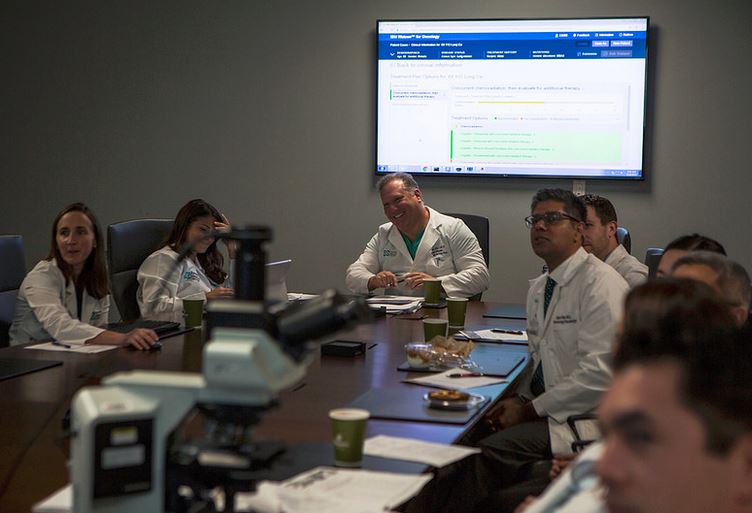Watson Health
A Trusted Treatment Option from Watson: Why Concordance Studies Matter
June 5, 2017 | Written by: Andrew Norden, MD
Categorized: Watson Health
Share this post:
Hearing diverse opinions from multiple oncologists is an important part of a patient’s journey, what’s often referred to as getting a second – or third – opinion. And cancer docs, too, frequently consult with one another to confirm a decision or provide a new idea. That’s understandable because cancer is a complex and sometimes elusive disease, and each person’s unique cancer may present unexpected challenges.

The tumor board at Jupiter Medical Center in Florida reviews new cancer cases and treatment options with the help of Watson for Oncology. (Credit: EPIC Creative)
This is the use-case for Watson for Oncology, where a patient’s medical data is fed into the cognitive computing system and Watson provides the doctor with a ranked set of treatment options along with the rationale and supporting evidence for each approach. But how often do Watson and doctors across the world come to the same conclusion?
Studies presented at the American Society of Clinical Oncology annual meeting in Chicago demonstrate that Watson for Oncology “agrees” with expert physicians around the world in the vast majority of cases.
How Watson Stacks Up to the Doctors Who Use It
At the Manipal Comprehensive Cancer Centre in Bangalore, India, Watson for Oncology matched the organization’s multidisciplinary tumor board’s treatment recommendations in 96 percent of its lung cancer cases. Watson also achieved 93 percent concordance with rectal cancer cases and 81 percent concordance with colon cancer cases as compared to recommendations by the hospital’s tumor board.
At Bumrungrad International Hospital in Bangkok, Thailand, Watson had an 83 percent concordance rate overall. And at Gachon University Gil Medical Center in Incheon, South Korea, Watson for Oncology was 73 percent concordant with physicians in high risk colon cancer cases. Interestingly, concordance dropped to 49 percent in certain gastric cancer cases at Gil Medical Center in Korea. This reflects differences in treatment guidelines and drug availability in this region of the world. However, providing Watson’s treatment options, informed by training from oncologists at Memorial Sloan Kettering, can still be valuable for these doctors.
As a cancer doctor myself, I often seek other opinions from trusted colleagues. Sometimes I get a handful of different treatment opinions from these experts. And all of them are reasonable. Sometimes those different opinions prompt a change in my treatment decisions when I review the supporting evidence, and sometimes the opinions simply corroborate the treatment that I had planned, boosting my confidence in the decision. This is exactly how Watson is intended to aid in clinical care.
Beyond concordance: AI speeds clinical trials screening
Providing guidance for cancer care decisions isn’t the only way AI is making a measurable difference in healthcare today. Clinical trials matching (CTM) in the U.S. can be an incredibly slow, inefficient and often manual process. With more than 88,000 clinical trials happening in the U.S alone as of May 2017, can be impossible for clinicians and researchers to keep up. A staggering number of clinical trials fail to meet recruitment goals simply because patients didn’t know they were happening or providers and clinical staff were not able to match them in time. Only 2-5 percent of cancer patients are enrolled in clinical trials at any given time.[i]
In a study with Highlands Oncology Group (HOG) and Novartis, applying Watson for CTM, providers cut the time required to screen patients for clinical trial eligibility by 78 percent. Without Watson CTM, it took HOG clinical trial coordinators 110 minutes to process 90 patients against 3 breast cancer protocols. With Watson, that time was reduced to 24 minutes. The time savings was largely achieved because Watson automatically excluded 94 percent of patients, enabling coordinators to focus on those who may be eligible.
But we all know that this isn’t only about data and studies. At the 55 organizations on 5 continents that are using Watson around the world, cognitive computing is making a real difference for patients. In many cases, it boosts confidence and reassures doctors and patients that care decisions are backed by the latest evidence. That’s how it helped TJ, a lung cancer patient at Jupiter Medical Center in Florida. In other cases it might surface a new idea. It might help a doctor give new hope to a patient.
Medicine is not black and white. In a grey world, AI is starting to prove its worth for both patients and healthcare professionals. But whether it’s improving the CTM process, enabling evidence-backed provider decisions, or giving patients the assurance they need to feel confident in their course of treatment, the purpose of AI will never be to replace humans as caregivers. It’s to use data and technology to improve how humans make decisions and ultimately deliver care.
___________________________________
[i] Institute of Medicine (US) Forum on Drug Discovery, Development, and Translation. Transforming Clinical Research in the United States: Challenges and Opportunities: Workshop Summary. Washington (DC): National Academies Press (US); 2010. 6, Clinical Trials in Cancer; 2. Murthy VH, et al. JAMA. 2004;291(22):2720-2726.

MD, MPH, MBA, Deputy Chief Health Officer, IBM Watson Health
Making the workplace safe for employees living with HIV
The recent promising news about Covid-19 vaccines is in sharp contrast to the absence of a vaccine for HIV, despite decades of research. Unlike Covid-19 with a single viral isolate that shows minimal diversity, HIV circulates in a wide range of strains that so far have proven impervious to a single vaccine. Fortunately, more people […]
Call for Code for Racial Justice Needs You: Join the Movement
IBM has never avoided taking on big challenges. At IBM, we are privileged to drive impact at scale. We take on challenges that transform our clients, impact people’s lives and innovate for future generations as we strive to effect systematic societal change. Over the course of our 109-year history, the evidence has become clear that […]
A New Wave: Transforming Our Understanding of Ocean Health
Humans have been plying the seas throughout history. But it wasn’t until the late 19th century that we began to truly study the ocean itself. An expedition in 1872 to 1876, by the Challenger, a converted Royal Navy gunship, traveled nearly 70,000 nautical miles and catalogued over 4,000 previously unknown species, building the foundations for modern […]


